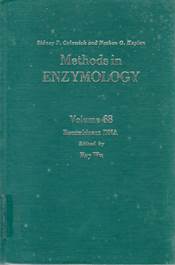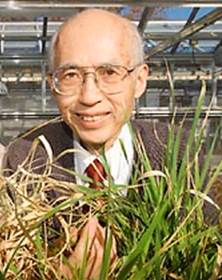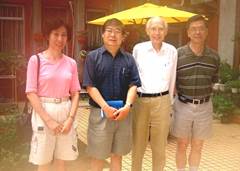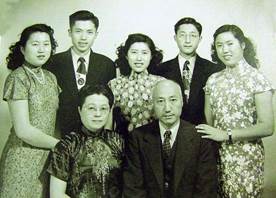The Founding Father of ABRC
Prof. Ray Wu (1928 --2008)
Dr. Ray Wu, the Liberty Hyde Bailey Professor of Molecular Biology and Genetics at Cornell University, passed away on Sunday, February 10, 2008, at the age of 79. Dr. Wu was a pioneer in DNA sequencing and recombinant DNA technology, a renowned scientist in rice genetic engineering, a strong and long time advocate for scientific research and education in Taiwan and China, and most of all, a genuine mentor and true friend to many of us.
Dr. Wu not only made major scientific discoveries in the field of DNA biochemistry and plant biology, but also worked tirelessly in fostering the careers of young people and promoting life sciences around the globe. Ray Wu was the Founding father of IBS, and now the ABRC. He worked on request from the former president of our Academy, Dr. Yuan Lee, to initiate an agriculture biotechnology program in 1995, and later they transformed the program into an institute, the Inst. of Bio-Agricultural Science. This was in 1998. This year is the 10th anniversary year, and that is why we are all here today. For the past 10 years, a very major, if not the most key, effort of Ray Wu is to help ABRC to grow and develop good research programs. Elsewhere in the world, it is also through Ray’s vision and hard work that the China and United States Biochemistry Examination and Application (CUSBEA) Program was initiated in 1982, which brought 425 young Chinese students to the United States for their graduate education. Dr. Wu's leadership, inspiration and now legacy has had and will continue to have a long lasting impact on us as we carry on our scientific pursuit, maintain the collegiality and friendship he fostered, and support science research and education in Taiwan and China.

In 1970 Wu developed the first method for sequencing DNA and some of the fundamental tools for DNA cloning. He made his own scientific mark in 1970, when he developed the primer extension approach for determining nucleotide sequences. Frederick Sanger improved on the method and won a Nobel Prize.
After several innovative modifications by other scientists to greatly speed up the process, the same strategy is still being used today, and led to the DNA sequence determination of the entire genomes of rice and human, among other organisms -- helping scientists to understand different genetic traits. This Vol. 68 of Methods in Enzymology on Recombinant DNA, a first such edition edited by Ray Wu used to be called “The Bible of Recombinant DNA”. And this volume was a must-read “textbook materials” between late 1970s and early1980s for young mol. biologist.

We, scientists at ABRC have asked Ray several years ago: 「Why you trained as a medical and mammalian biochemist and molecular biologist, earned a high reputation in pioneer works in recombinant DNA and molecular biology research, would suddenly change mind and shift gear in mid 1980s to pursue research into plant genetic engineering?」 He replied in a kind of smile as we see here in this picture:「Oh!! You have to look at the important things in your life. After some thinking, I feel strongly about the Chinese saying of (民以食為天), or Food is the fundamental need for human society, and for this, rice is the most important staple food worldwide, so I decided to change my work into rice, you can say it is a conviction.」
Following his pioneering transgenic rice work in the 1980s on the development of efficient transformation systems for rice, Wu and his group genetically engineered rice plants resistant to pests, drought and salt. We, PIs at ABRC, would like to thank Ray Wu for his continuous encouragement and support of our team work on plant stress-biology.

Among other advisory roles to both the Taiwanese and Chinese governments, especially to ABRC of the Academy, Ray Wu was also instrumental in establishing the Institute of Molecular Biology some 20 years ago, and the National Institute of Biological Sciences in Beijing, and he also served as a scientific advisor to the Inst. for Plant and Microbial biology of our Academy.
Born in Beijing on Aug. 14, 1928, Wu came to the United States in 1948 at the urging of his father who at the time was attending professional meetings in San Francisco. His father Hsien Wu was the pioneer worker with Lowry on the biuret-protein concentration assay, so called Lowry & Wu test.

This event was recollected at the JBC 100 yrs anniversary/FASAB meeting in 2006, in San Francisco. The wonderful story of Ray Wu and his father was mentioned in this wonderful occasion.
The colleagues at the Cornell University re-collected Ray Wu’s Cornell career as follows. 「"For many years and continuing to the present, Ray and his collaborators worked successfully to develop genetically modified strains of rice that are tolerant to drought- and salt-stress, in order to help feed the large fraction of humanity that depends on rice as a staple food. His commitment to this goal was unwavering”, as was reflected, Ray's thoughtful advice and even-tempered judgment were hallmarks by which he will long be remembered. His 'can do' attitude toward solving both scientific and human relationship problems, always with respect for others and without anger or prejudice, set the highest standard for all of his colleagues."」
We, at ABRC and the Academy would like to refresh ourselves with the wonderful experience and generous spirit of Ray Wu with the following snap shots. The soft smiles with generosity!! Thoughtful Advices!! Even -tempered judgment! and lots of caring for all of us.
Ray attended many seminars, often sitting in the first row and taking lots of notes. This hallmark of Ray was witnessed and reported by many of us, including Elizabeth Earle, Susan McCouch, S.-M. Yu, N.-S. Yang and many other scientists at ABRC, IMB, Cetus and Cornell.
At ABRC, we were raised, tutored, nourished and guided by Ray Wu with your untiring help and generosity and your legacy will remain with us forever. For the so called “translational” and “mission-oriented” research, Ray had a vision and a commitment to see that the research results from Lab bench can effectively benefit the whole world, sooner than later.
